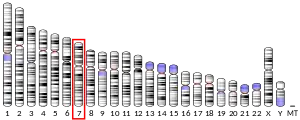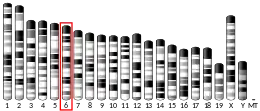JAZF1
Juxtaposed with another zinc finger protein 1 (JAZF1) also known as TAK1-interacting protein 27 (TIP27) or zinc finger protein 802 (ZNF802) is a protein that in humans is encoded by the JAZF1 gene.[5][6] Variants are associated with an increased risk of prostate cancer, an increased risk of type 2 diabetes, and an increased height.[7]
Function
This gene encodes a nuclear protein with three C2H2-type zinc fingers, and functions as a transcriptional repressor. Chromosomal aberrations involving this gene are associated with endometrial stromal tumors. Alternatively spliced variants which encode different protein isoforms have been described; however, not all variants have been fully characterized[6]
References
- GRCh38: Ensembl release 89: ENSG00000153814 - Ensembl, May 2017
- GRCm38: Ensembl release 89: ENSMUSG00000063568 - Ensembl, May 2017
- "Human PubMed Reference:". National Center for Biotechnology Information, U.S. National Library of Medicine.
- "Mouse PubMed Reference:". National Center for Biotechnology Information, U.S. National Library of Medicine.
- Adams MD, Soares MB, Kerlavage AR, Fields C, Venter JC (Nov 1993). "Rapid cDNA sequencing (expressed sequence tags) from a directionally cloned human infant brain cDNA library". Nat Genet. 4 (4): 373–80. doi:10.1038/ng0893-373. PMID 8401585. S2CID 12612300.
- "Entrez Gene: JAZF1 JAZF zinc finger 1".
- Manolio TA; Guttmacher, Alan E.; Manolio, Teri A. (July 2010). "Genomewide Association Studies and Assessment of the Risk of Disease". N Engl J Med. 363 (2): 166–176. doi:10.1056/NEJMra0905980. PMID 20647212.
Further reading
- Koontz JI, Soreng AL, Nucci M, et al. (2001). "Frequent fusion of the JAZF1 and JJAZ1 genes in endometrial stromal tumors". Proc. Natl. Acad. Sci. U.S.A. 98 (11): 6348–53. doi:10.1073/pnas.101132598. PMC 33471. PMID 11371647.
- Strausberg RL, Feingold EA, Grouse LH, et al. (2003). "Generation and initial analysis of more than 15,000 full-length human and mouse cDNA sequences". Proc. Natl. Acad. Sci. U.S.A. 99 (26): 16899–903. doi:10.1073/pnas.242603899. PMC 139241. PMID 12477932.
- Scherer SW, Cheung J, MacDonald JR, et al. (2003). "Human Chromosome 7: DNA Sequence and Biology". Science. 300 (5620): 767–72. doi:10.1126/science.1083423. PMC 2882961. PMID 12690205.
- Ota T, Suzuki Y, Nishikawa T, et al. (2004). "Complete sequencing and characterization of 21,243 full-length human cDNAs". Nat. Genet. 36 (1): 40–5. doi:10.1038/ng1285. PMID 14702039.
- Huang HY, Ladanyi M, Soslow RA (2004). "Molecular detection of JAZF1-JJAZ1 gene fusion in endometrial stromal neoplasms with classic and variant histology: evidence for genetic heterogeneity". Am. J. Surg. Pathol. 28 (2): 224–32. doi:10.1097/00000478-200402000-00010. PMID 15043312. S2CID 21043514.
- Nakajima T, Fujino S, Nakanishi G, et al. (2004). "TIP27: a novel repressor of the nuclear orphan receptor TAK1/TR4". Nucleic Acids Res. 32 (14): 4194–204. doi:10.1093/nar/gkh741. PMC 514368. PMID 15302918.
- Gerhard DS, Wagner L, Feingold EA, et al. (2004). "The Status, Quality, and Expansion of the NIH Full-Length cDNA Project: The Mammalian Gene Collection (MGC)". Genome Res. 14 (10B): 2121–7. doi:10.1101/gr.2596504. PMC 528928. PMID 15489334.
- Kimura K, Wakamatsu A, Suzuki Y, et al. (2006). "Diversification of transcriptional modulation: Large-scale identification and characterization of putative alternative promoters of human genes". Genome Res. 16 (1): 55–65. doi:10.1101/gr.4039406. PMC 1356129. PMID 16344560.
- Micci F, Panagopoulos I, Bjerkehagen B, Heim S (2006). "Consistent rearrangement of chromosomal band 6p21 with generation of fusion genes JAZF1/PHF1 and EPC1/PHF1 in endometrial stromal sarcoma". Cancer Res. 66 (1): 107–12. doi:10.1158/0008-5472.CAN-05-2485. PMID 16397222.
- Nucci MR, Harburger D, Koontz J, et al. (2007). "Molecular analysis of the JAZF1-JJAZ1 gene fusion by RT-PCR and fluorescence in situ hybridization in endometrial stromal neoplasms". Am. J. Surg. Pathol. 31 (1): 65–70. doi:10.1097/01.pas.0000213327.86992.d1. PMID 17197920. S2CID 36622314.
- Oliva E, de Leval L, Soslow RA, Herens C (2007). "High frequency of JAZF1-JJAZ1 gene fusion in endometrial stromal tumors with smooth muscle differentiation by interphase FISH detection". Am. J. Surg. Pathol. 31 (8): 1277–84. doi:10.1097/PAS.0b013e318031f012. PMID 17667554. S2CID 37204785.
This article is issued from Wikipedia. The text is licensed under Creative Commons - Attribution - Sharealike. Additional terms may apply for the media files.




